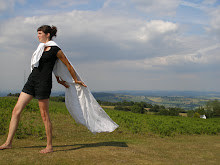 Gabriele, the son of mastro fornaio Antonio Maggiore, picks me up from the main piazza of Martignano, 15-or-so Kilometres from Lecce. As we drive out of town towards the bakery in the Zona Industriale, asks me if I like dogs. Yes, luckily, as we arrive at a compound containing 5 huge Alsatians and a bakery. Gabriele tells me the dogs' names as they crowd delightedly around him, then he invites me into the front office of the bakery. The dogs follow. They are sent back out, though they continue to play Grandmother's Footsteps all day.
Gabriele, the son of mastro fornaio Antonio Maggiore, picks me up from the main piazza of Martignano, 15-or-so Kilometres from Lecce. As we drive out of town towards the bakery in the Zona Industriale, asks me if I like dogs. Yes, luckily, as we arrive at a compound containing 5 huge Alsatians and a bakery. Gabriele tells me the dogs' names as they crowd delightedly around him, then he invites me into the front office of the bakery. The dogs follow. They are sent back out, though they continue to play Grandmother's Footsteps all day.Gabriele is very young, self-possessed and unruffled by his work or the added task of showing me around. He works with his father, mother, aunt, uncle and two other female employees. The bakery is fairly mechanised, with a machine for shaping loaves and another, a more elaborate affair, for shaping Tarralli and Friselle, the double-cooked (biscotto) breads that are popular here and in Campagnia - also in Calabria and Sicily, hot places where it's best to start with your bread pre-dried as it'll only dry out anyway. They have 3 ovens, two electric and one (Gabriele's face lights up as he shows me) forno a legna. He opens the door and shines a torch inside to show me a low, wide oven space with stones worn-down and wonky from use. This is something I've never seen before - how many shoves of the peel and scrapes of the fire-hoe would make a oven floor look like this?
“We can only bake the large loaves on this one,” he says “smaller breads... well...” I can see it would be frustrating to try fishing Tarralli out of the gaps between the stones. The fire is lit on the main oven, using faggots of olive twigs, then scraped into the left-hand corner. Heat is maintained by moving the coals to the fire-chamber below the oven door. Afterwards, the oven is wet-mopped and loaded by two people, one lifting the breads from the boards that they've been rising on, and the other operating the peel.
Dough is made a day in advance. Durum wheat flour is weighed out on an upright scale and tipped into the spiral mixer with flour, water salt and yeast. "We do put in old dough, but only when we have it, it's not part of the recipe" says Gabriele. The mixing is watched-over by Gabriele's uncle who checks its readiness then pulls it out of the bowl and throws it into a hopper for semi-automatic weighing and balling. 'Semi'-automatic because it still seems to take a certain amount of human intervention to get a correct shape out at the end. The balls of dough drop either onto a conical baller, which twirls the dough upwards and shapes a taut ball by friction, or through a tunnel on a conveyor-belt that flattens, then rolls, the dough into longer filoni. As they pop from the machine, G's aunt catches them with both hands and carefully puts each one onto the waiting, semolina-dredged board.
After their single shaping, the balls of dough left in a retarder overnight on their boards. Production is limited to the amount they can fit onto the three carrelli – (trolleys) that can be wheeled into the retarder.
The air is hot and smells of olive oil, cooking vegetables and rising dough. There is constant noise from the chuffing and wheezing machines but, above all else, the sound of voices. They yell and argue and then laugh and simmer down. It seems that always someone has forgotten to do this or finish that. Nobody's really angry, it's just a family working together in a hot kitchen.
While Gabriele is away meeting a client, the other 4 scrape-down the metal tables, sweep up and put all in place for the next day (Gabriele's father comes in at 4.30am to fire the oven). Gabriele's mum invites me to supper at their home, or is it lunch? Anyway, it is very welcome. They continue to discuss business over their food, then conversation moves to the politics and what's happening with TV in Italy. Italy's going completely digital this year, which is seen by many as Berlusconi's way of building his domination of the Italian media. As we eat (no bread at this table), we watch the news. After, Gabriele drives me back to Lecce with a bag full of gorgeous-smelling bread. He's a bit pensive: Although business is good, he's set his sights on finding a sales outlet in Britain and he's worried that his country is not taken seriously by the rest of Europe. He's intelligent, though, and the bakery business is not so exhausting for him yet that he doesn't have time to step back and see it in perspective.

Gah! Enough of the bread already! Bread bread bread, that's all I ever hear.
ReplyDeleteBut seriously, interesting and entertaining! And the pictures are fabberluss.